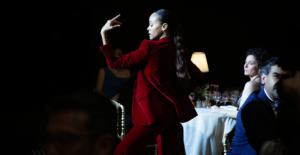La Couleur Pourpre
The Color Purple
2023/2024

FR EN
Retour sur cette histoire d’émancipation et de solidarité féminine envers et contre toute forme de domination à travers le destin de deux sœurs et d’une jeune femme noire mariée de force, abusée et battue dans la Géorgie ségrégationniste du début du XXe siècle. Car c’est bien la puissance des femmes qui est au centre de ce récit sombre et cruel écrit par Alice Walker dans le classique de la littérature américaine (1982) adapté au cinéma par Steven Spielberg (en 1985 avec Whoopi Goldberg) puis transposé sur scène à Broadway (en 2005) avant de revenir sur le grand écran cette année avec cette adaptation de la comédie musicale.
Si le film de Spielberg jouait surtout sur sa grande force émotionnelle, cette version plus militante, plus féministe et plus ancrée dans la culture afro-américaine, de « La Couleur Pourpre » réalisée par Blitz Bazawule (The Burial of Kojo ; Black is King) s’appuie surtout sur l’énergie folle de la pièce de Broadway et ses morceaux de blues, ragtime et gospel rythmant ses chorégraphies savamment mises en scène. Pour son premier rôle au cinéma, Fantasia Barrino reprend son rôle principal de Broadway aux côtés notamment de Danielle Brooks (nommée aux Oscars), Taraji P. Henson, Colman Domingo, Corey Hawkins, Halle Bailey, H.E.R. et Jon Batiste. Ce talentueux casting avec ses costumes et ses décors très travaillés donnent lieu à de belles scènes et quelques envolées oniriques.
Mais si les chansons et les chorégraphies sont de qualité, l’ensemble ne fonctionne pourtant pas. La faute à un scénario trop pauvre qui ne crée jamais le moindre enjeu pour ses personnages et surligne à gros traits son message avec des dialogues souvent banals. Bien que le rythme soit très soutenu pendant près de 2h20, on s’ennuie sec dans ce récit bien calé sur ses rails de prévisibilité à grande vitesse. Il ne se pause malheureusement que trop peu et ne développe quasiment pas son histoire pourtant construite sur une époque, un contexte et une toile de fond très riches dans cette période post-esclavage où le racisme blanc persiste toujours et pire, où la population afro-américaine en reproduit le système en son propre sein.
Comme si on était à Broadway, la mise en scène joue sur la théâtralisation de ses environnements mais au risque de les rendre par moments peu crédibles, ce qui ne favorise pas notre immersion dans l’intrigue. Et toujours dans le style Broadway, les rôles sont de plus surjoués au point de se demander parfois s’ils ne sont pas plutôt mal joués. Bref, à part une superbe chanson, de belles chorégraphies, et une intrigue bel et bien intéressante et forte dans le fond, cette nouvelle version (produite par Oprah Winfrey et Steven Spielberg) de « La Couleur Pourpre » ne convainc clairement pas à partir du moment où elle n’arrive tout simplement pas à nous captiver.
Raphaël Sallenave
This is the story of emancipation and female solidarity against all forms of oppression, through the destiny of two sisters and a young black woman who was forcibly married, abused and beaten in the segregated Georgia of the early 20th century. After all, it’s the power of women that lies at the heart of this dark, cruel tale, written by Alice Walker in the classic American novel (1982) and adapted for the screen by Steven Spielberg (in 1985, starring Whoopi Goldberg), then brought to the stage on Broadway (in 2005), before coming back to the big screen today with this adaptation of the musical.
While Spielberg’s film drew on its great emotional power, this more militant, more feminist and more deeply rooted in African-American culture version of “The Color Purple”, directed by Blitz Bazawule (The Burial of Kojo; Black is King), relies above all on the wild energy of the Broadway play, with its blues, ragtime and gospel tunes pacing its skillfully staged choreography. For her first film role, Fantasia Barrino reprises her Broadway starring role, alongside Oscar nominee Danielle Brooks, Taraji P. Henson, Colman Domingo, Corey Hawkins, Halle Bailey, H.E.R. and Jon Batiste. This talented cast, together with the elaborate costumes and sets, makes for beautiful scenes and some dreamlike outbursts.
But while the songs and choreography are top-notch, the whole thing just doesn’t work. This is down to the poor script, which never creates the slightest stake for its characters, and overemphasizes its message with often rather flat dialogue. Although the pace is brisk for almost 140 minutes, there’s a dry dullness to the story, which is firmly stuck on the rails of high-speed predictability. Unfortunately, it doesn’t breathe enough and hardly develops its story, despite its rich period, context and backdrop in the post-slavery era, where white racism still persists, and worse, where the African-American population reproduces that system within its own midst.
As if we were on Broadway, the staging uses a theatrical approach to its environments, running the risk of making them at times hardly believable, which doesn’t make it any easier to get involved in the story. And in keeping with the Broadway style, the roles are also overplayed, to the point where you sometimes wonder whether they’re not just badly acted. In short, apart from a great song, beautiful choreographies and a plot that’s interesting and powerful in essence, this latest version (produced by Oprah Winfrey and Steven Spielberg) of “The Color Purple” is clearly unconvincing, as it simply doesn’t manage to captivate us.
Raphaël Sallenave

